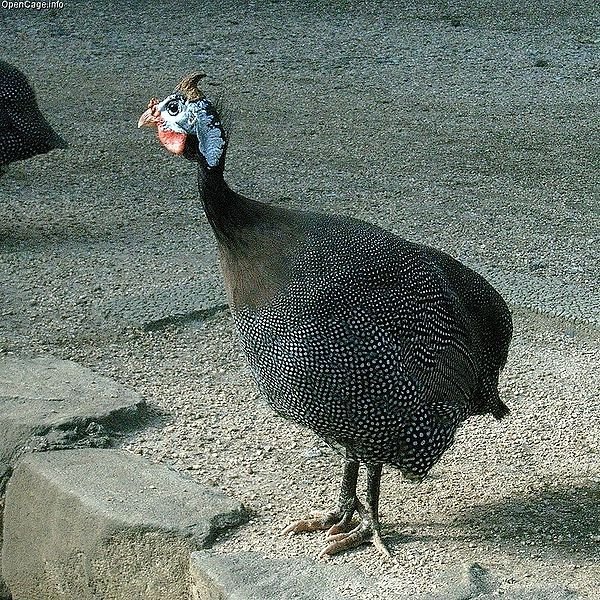Farmstead Pest Control Secret Weapon: Guinea Fowl

(Original Image)
Pest insects are annoying and farm/homestead (farmstead) pests are even worse. Not only do they annoy us but they often do serious damage to our crops. Things that seriously damage our crops hurt our farmsteads economic incentive. Plants that fail to produce or produce poor product hurts us by reducing the amount of return we get for our efforts and may even lead to new expenses in the form of replacing insect damaged plants. As you know both of those things can end up costing us and causing delays in our plans to harvest/preserve or sell excess. The conundrum is how to attack these pests without resorting to some pesticide/ insect chemical weapon that could end up poisoning our animals or our families. So, the question remains, what to do? The answer may be easier than you think, Guinea fowl.
The introductory picture is of a batch of thirty little Guinea keets that are just a couple days old. We try to keep between thirty to fifty guineas around the cleared areas (approx. four acres) of the farmstead for pest control. Guineas are a widely adaptable bird that are found all over the world and in wide ranging habitats jungle to desert and everything in between.

Guineas are flocking birds and so move about in a group. Their primary diet is insects as well as seeds and the like. A wonderful bonus feature of the guinea is that unlike chickens they very rarely scratch the ground. This is great when you are considering their use for the garden. Chickens can do an incredible amount of damage to a garden between their scratching and eating the plants themselves, but this is not a concern with guineas. They will move about the garden in search of the insects that they prefer with no noticeable damage to the plants themselves.
An added benefit/potential drawback is the sound of the call that the guinea makes. They can be rather loud in larger groups but even a small quantity could be a concern if you have close/ difficult neighbors. The benefit to this loud call is that no one, and I mean no one, will ever sneak up on your farmstead again. Be it fox or box truck, four legged predators or two legged there is no sneaking past a flock of guineas. Of course this is service is provided during the daylight hours and a good guardian dog is suggested to fill the void during the hours of darkness. Have a listen to the calls for yourself:
I recommend guinea fowl to any farmsteaders looking to manage pests in a way that is in line with Good Stewardship /permaculture principles. There are many sources for guineas online we have purchased from McMurray Hatchery(https://www.mcmurrayhatchery.com/guineas.html) (Not an affiliate link) in the past with good results. My suggestion however is to search the local agricultural bulletins or trade papers for locally available guineas as they should be considerably cheaper and avoid the shipping fees. For more great information on guineas and their practical application to the farmstead check out this link: http://www.motherearthnews.com/Homesteading-and-Livestock/raising-guinea-fowl-zmaz92aszshe
I would love to hear other experiences with guinea fowl, so please feel free to comment with yours. I hope this helps.
We used to have guineas on the farm I grew up on. You are spot on about no one sneaking up on your place with guineas around during the day. And there's the added bonus of keeping fleas, ticks, and chiggers in the yard under control as well.
Thank you for your comment. You are correct about the fleas,chiggers, and ticks being kept under control by the guineas. That is the way that we inially discovered their usefulness. With four children we wanted a way to mitigate the risk of tick bits without resorting to poisoning everything, we thought that was pretty contrary to why we live where and how we do.
Good post
Thank you.
I love guineas and how great they work! My husband can't stand how they sound so we don't have any yet! How do you keep them in your yard, they seem to wander with anyone I know that has had them...
Thank you for your comment. Yes, they do tend to wander. While they do range quite a ways they generally tend to stay near the farm. We keep some feed available, but they eat little of it when better food is available. I think it has a great deal to do with being raised here from hatchlings.
They look like the wild turkeys that fly/wander on our property.
Would the guinea fowls be tempted to follow them?
Can they fly?
Thank you for the reply. Yes, they are capable of flying and typically roost in trees or other available high perches. We have wild turkeys on our property and surrounding areas as well but I have never seen them wander off to follow the turkeys. I hope that helps.
Yes, that is exactly what I want to know and so glad you have direct experience with this.
I think we will try to get some newly hatched when the time comes because their beneficial qualities seem just suited to our needs. I see other people do have them locally (New Hampshire) so they should be able to survive the winters.
Once I saw our rooster chase a small turkey around in a circle from our property into the woods and then back out.
Congratulations @wbrianjolly! You have received a personal award!
Click on the badge to view your own Board of Honor on SteemitBoard.
For more information about this award, click here
Congratulations @wbrianjolly! You received a personal award!
You can view your badges on your Steem Board and compare to others on the Steem Ranking
Vote for @Steemitboard as a witness to get one more award and increased upvotes!